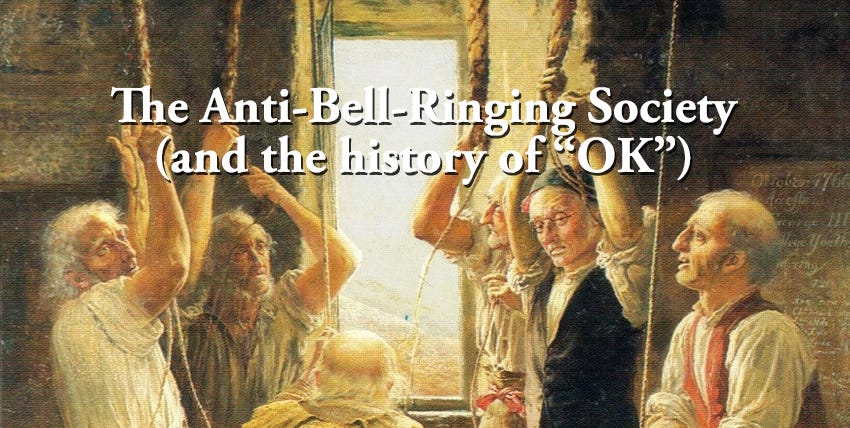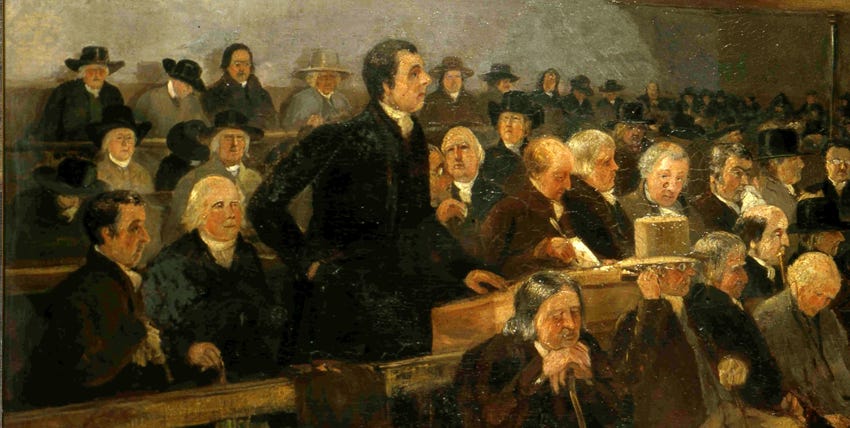The Most Spoken Word on the Planet Owes Its Origin to the “Anti-Bell-Ringing Society”
The absolutely preposterous true story of “O.K.”
Skip to the end (or click here) for a puzzle I’ve made you. My crash course on how to do cryptic puzzles begins here.

The first thing you should know about the Anti-Bell-Ringing Society (ABRS) is that they were decidedly pro- bell-ringing. They were formed in Boston on October 26, 1838, as a satirically aggrieved response to a recent ordinance by the Boston Common Council banning the ringing of dinner bells. Thanks to the etymologist Allen Walker Read (who is very much the hero of this particular story), we know that the ABRS were motivated by the sort of Libertarian crankery that read as highly amusing until, honestly, fairly recently. Described by the Boston Morning Post in 1839:
The main design of the founders of the Society was and is, to expose and oppose, by ridicule and otherwise, the spirit of ultraism in legislation, which is so prevailing a characteristic of the present time.
The Boston media was very much taken with the ABRS, which, according to Read, was prone to raucous meetings presided over by officers with titles like “Imperturbable Deliberator,” “Confabulator, to do Unnecessary Talking,” and “Benign Reliever of the Bell-y-ache,” who opened their proceedings with toasts to “The ladies — the only belles the members of this society will ever ring.”

And as this was a pretty decent joke, the local media — particularly Charles Gordon Greene, the editor of the Morning Post — were quite keen to be in on it, publishing a number of witty updates about the doings of the society in the peculiar style of the time, which (importantly) was in the midst of what can only be described as a mania for humorous abbreviation. A letter to the paper in 1838, also unearthed by Read, shows just how far this mania had advanced:
Mr. Greene, — The present age is one pregnant with experiments. … There is yet one other sect, whose efforts carry them back to still remoter ages — disciples, it may be, of the illustrious Noah [Webster] — who, in their fondness for a brevity in writing, would discard every letter in a word, but that with which it commences.
Common abbreviations at the time were G.C. (for Gin Cocktail), O.F.M. (for Our First Men — meaning the local dandies), and G.T. (Gone to Texas — presumably to escape legal difficulties), many of which were gleefully introduced or encouraged by Greene himself in his columns for the Morning Post. Some of the more memorable inventions pushed the joke even further by willfully misspelling the words that were to be abbreviated: Greene was fond of O.W. (for “all right,” spelled “oll wright”), and an 1839 column in the New York Evening Tattler wondered at the “more original, richer and less comprehensible” abridgements made by “people who spell ‘on their own hook’”:
For instance, “K.G.” (no go), K.Y. (no use) and K.K.K. (commit no nuisance). ... Apropos to this is the toast given by a country schoolmaster. “The Three Rs—Reading, ’Riting and ’Rithmetic.”
To get a sense of the vibe here, it’s useful to remember the early Internet craze for deliberate typos: Writing “The” as “Teh;” “Owned” as “Pwned;” “Hacker” as “Haxor;” and “Porn” as “Pr0n.” (If you missed this phase of the Web, more power to you, but it was really quite unavoidable for about 5 years.) As Allan Metcalf has written in his very fun history of the origins of “OK,” this type of wacky wordplay carries with it “the implication of insider knowledge, that those who use it deliberately share an understanding that others don’t.”
It was in this quirky climate that Charles Gordon Greene accidentally made history with a briefing about our iconoclastic bell-ringers that is utterly incomprehensible unless you’ve wrapped your head around all of the above and more. It’s genuinely quite funny how much context you need to understand this historic paragraph, but I’m going to give you the bare minimum to make it through. Deep breath:
After an announcement by Greene in the Boston Morning Post that the members of the ABRS were taking a trip to New York on a steamship called The Richmond, the Providence Daily Journal misconstrued the bulletin to be suggesting that the bell-ringers (with their absurdly lengthy titles and their anti-Nanny State agenda) would be passing through Providence. The editor of the Daily Journal filed a blurb about his disappointment when the ABRS never showed, and Greene felt compelled to respond in the Morning Post, quoting the blurb and adding the following comment (emphasis mine):
The above is from the Providence Journal, the editor of which is a little too quick on the trigger, on this occasion. We said not a word about our deputation passing "through the city" of Providence. — We said our brethren were going to New York in the Richmond, and they did go, as per Post of Thursday. The "Chairman of the Committee on Charity Lecture Bells" is one of the deputation, and perhaps if he should return to Boston, via Providence, he of the Journal, and his train-band, would have the “contribution box,” et ceteras, o.k. — all correct — and cause the corks to fly, like sparks, upward.
This, more or less definitively, is where “OK” comes from. The first word spoken on the moon (“OK. Engine stop.”). The most typed word on the planet (by some accounts). The ubiquitous resident of almost every conversation, which can somehow mean “Good,” “Not very good,” “Yes,” and “Listen!” depending on how it’s deployed.

Before Allen Walker Read discovered this origin story in 1963, “O.K.” — especially given those periods indicating an abbreviation — was a powerful mystery. There were theories that it came from the Scottish affirmation “och aye;” the Native American Choctaw expression “okeh;” a popular brand of army biscuits made by Orrin Kendall; the Haitian seaport sometimes called “Aux Cayes;” and a Civil War abbreviation meaning “Zero Killed.”
But Charles Gordon Greene’s deliberately ridiculous “Oll Korrect” on March 23, 1839, had an incredible run of luck that sent it right into the stratosphere. (Like sparks. Or Apollo 11.) First, President Martin Van Buren adopted the nickname “Old Kinderhook” (referring to his birthplace in Kinderhook, NY) in his reelection campaign in 1840, encouraging supporters and sloganeers to associate it with the newly minted O.K. The rise of the telegraph around the same time made “OK” a very useful shorthand. And an extremely viral rumor that President Andrew Jackson was illiterate (and thus signed his papers “Ole Kurrek” — all correct) sealed the deal.

This past week (March 23) marked the 184th anniversary of the unlikely moment when a witty Boston newspaper editor, a passing craze for increasingly stupid abbreviations, and a satirical society in favor of bell-ringing called the Anti-Bell-Ringing Society combined to give us one of the most useful words we have.
Please don’t abuse its storied legacy (and make me think you hate me) by texting me, “K.”
I have made you a puzzle. The puzzle image is below if you want to print it out like our forebears used to, but you can also fill it in with a click!





